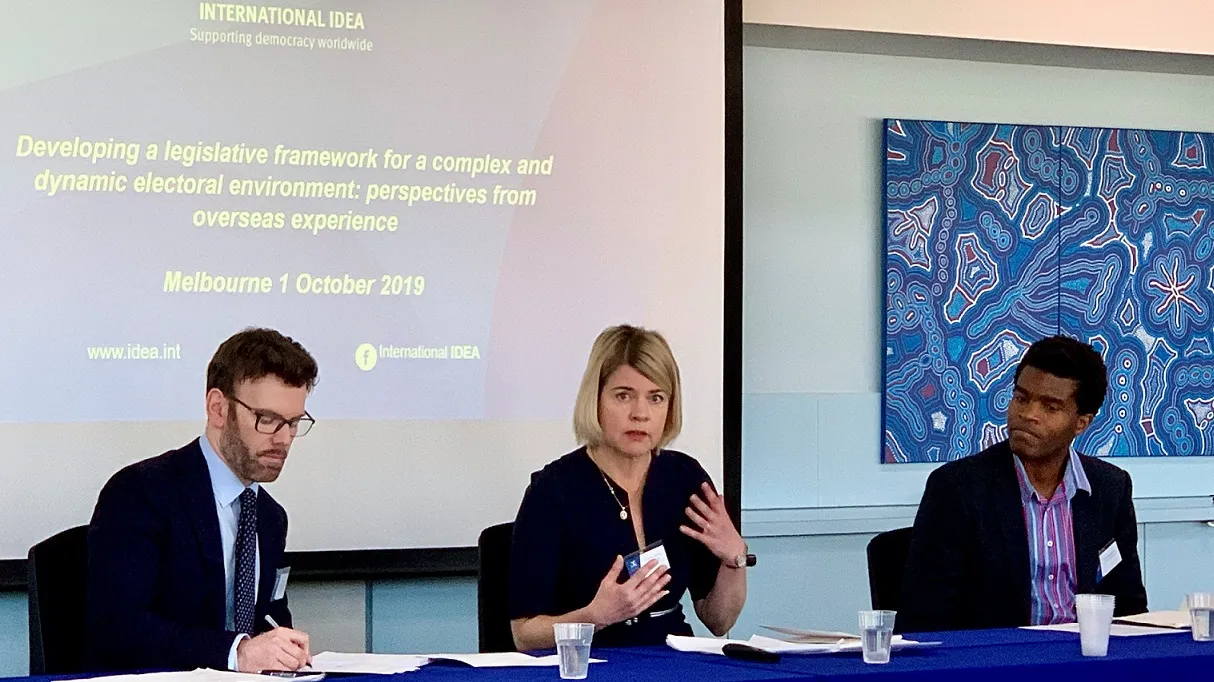Prescriptive versus principles-based electoral laws

International IDEA was invited to present its views on delegated electoral rule-making at the Electoral Regulation Research Network’s workshop in Melbourne, Australia, on 1 October 2019. The topic derived from a discussion paper by Michael Maley and Graeme Orr about the tension between prescriptive electoral legislation and principles-based ones (the paper will be available on the Network’s website later in the year).
Disclaimer: Views expressed in this commentary are those of the staff member. This commentary is independent of specific national or political interests. Views expressed do not necessarily represent the institutional position of International IDEA, its Board of Advisers or its Council of Member States.
The paper explained that prescriptive laws, like Australia’s Electoral Act, are very detailed and would prescribe technical details. As consequence, they are long and complicated leaving less room for rule-making by electoral management bodies (EMBs). On the other hand, principles-based ones, such as France’s election law, tend to only state the principles and set the necessary standards for electoral process leaving much room for rule-making and determination of technical details for implementation to the EMB.
In her presentation, Leena Rikkilä-Tamang, Regional Director for Asia and the Pacific representing International IDEA, pointed out the need to regard three factors affecting the level of prescriptiveness in electoral laws. First is the political history and legal tradition of the country. The aforementioned French example shows the European continental law drafting tradition, while the Australian one is evidence of the tendency for lawmakers to make detailed laws. The second factor is the model of EMBs, that is independent, mixed or governmental and the level of trust bestowed upon them. While the third factor is the emergence of new risks and challenges that would require quick reactions, most likely from the EMB, while lawmaking is generally slow and tedious process. The issue of cybersecurity in elections was exposed as one of those new risks.
Throughout the workshop, the merits for Australia moving from “detailed prescriptive electoral legislation” towards a more “principles-based electoral legislation” and a more “delegated rule-making” dominated the discussion. Australia’s Electoral Act is very dense and specific—famously it specifically requires the use of a pencil for marking ballots, something they have kept from the beginning of elections in early 1900s. While the EMB is keen to have this changed to, presumably, a pen, the Parliament decade after decade has not regarded this as a priority. Leena in her presentation highlighted the South African example where they have less complicated electoral legislation in plain language has been considered important to ensure as many people possible are able to understand it. South Africa’s Independent Election Commission is also mandated by law to review electoral legislation and to recommend changes. This is quite different to the mandates of many EMBs, including the Australian Electoral Commission (AEC).
Weighing in on this debate as presenters, the President of the Australian Senate, Senator Scott Ryan from the Liberal Party, Andrew Giles MP from the Labor Party and Senator Larissa Waters from the Australian Greens were united in the view that prescriptive electoral legislation. They argued that leaving little to no room for rule-making by the AEC would protect their independence. The AEC will be spared from political controversies that may appear from the rules and legal interpretations of the electoral law, if they were given much role in rule-making. While it is not surprising that lawmakers would favour prescriptive electoral legislation, many in the audience seem to acknowledge its advantages.
However, Iain Loganathan, the Electoral Commissioner of the Australian Northern Territory, reminded the perils of legislation being too prescriptive. The voter registration process as provided by the Electoral Act fit well for people living in the urban areas and rural areas with fixed addresses. It is a challenge for those living in remote areas like many of the indigenous population of the Northern Territory. As a result, some 25,000 indigenous people are suspected to have been left out of the Voter Roll due to incompatibility of their residential conditions with the law. Had the EMB were given the delegated authority to make the necessary regulation to address this issue, the number of voters could be significantly increased.
At the end of the day, there is no ‘magic formula’ towards how much detail legislation should include or how much authority should be delegated to the EMB to rule. As cited by the Maley & Orr paper, one of International IDEA’s classic books published in 2002, “International Electoral Standards: Guidelines for reviewing the legal framework of elections”, suggests “fundamental issues” that should be provided by the Constitution or a law, such as: qualification and restrictions to be registered as voter; qualification and restrictions as candidates; seat allocation rules; terms of office; methods for filling casual vacancies; removal of mandates; secrecy of the votes; and management of elections.
One needs to also acknowledge that political history is one important influencing factor, which in Australia’s case leans towards less delegated rule-making and in the case of neighbouring country Indonesia that has a European continental legal tradition leans towards more delegated rule-making. In any case, whatever the proportion of delegated rule-making, the following safeguards need to be in place:
- Participatory law- and/or rule-making: The Maley & Orr discussion paper stated that all stakeholders in the electoral processhave the right and expectation to have their perspectives taken into account. Through such a participatory legal framework development, ideas and thoughts of the broad spectrum of stakeholders are included, considered and debated. As such, the disadvantage of prescriptive laws being too complicated and difficult to comprehend and of delegated rule-making being a threat to an EMB’s independence can be minimised. In Fiji, such a participatory process has been missing leading to some dismay and distrust towards the electoral process, including the EMB, among political parties and civil society.
- Robust judicial review system:The Maley & Orr listed a number of conditions required for delegated rule-making—many of which are related to the nature of the EMB. Sceptical politicians and civil society alike may find comfort in their ability to challenge any EMB regulations they find in breach of the principles and standards set by legislation to an independent court of law in a speedy way; given electoral processes follow a tight schedule and any legal dispute would require quick resolution. Again, taking Indonesia as an example, regulations made by the EMB can be brought to the Supreme Court for judicial review where the case is review through an expedited process. Conversely, in the Philippines, the EMB itself is an adjudicatory body and its Supreme Court is not known for quick resolution of electoral cases.
As with many aspects of elections, this matter has no “one-size fits all” solution. Whether prescriptive or principles-based, each country’s context would determine which type is most appropriate for electoral legislation.




